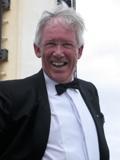David Rushbrooke pens a personal trubute to Thomas K Hodgson

It is with great sadness that I report the death at the age of 63, of Thomas K Hodgson, Dispensing Optician of Rhyl, Denbighshire, after a brief but severe illness. It was my enormous privilege and great pleasure to work alongside Tom for only a few months short of 30 years.
Tom was a scouser by birth, but a proud Welshman by inclination. Although born in Liverpool to a Manx mother and a Cumbrian father, he moved to North Wales with the family when his father, who worked for Pilkington’s as it then was, relocated there to work in their St. Asaph facility.
Register now to continue reading
Thank you for visiting Optician Online. Register now to access up to 10 news and opinion articles a month.
Register
Already have an account? Sign in here
